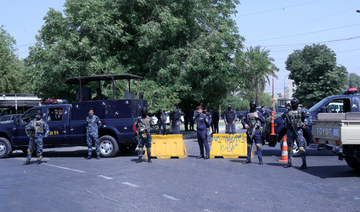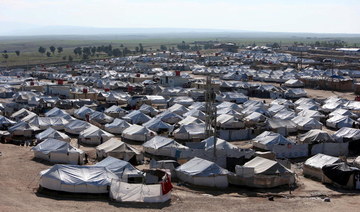ALEPPO, Syria: In Arabic, the word Shifaa means “to heal.” The aptly named Al-Shifaa hospital in northwest Syria was the largest in rebel-held Afrin, treating tens of thousands of patients every month. With its emergency room and maternity unit, including pre- and post-natal care for mothers and their children, Al-Shifaa offered many Syrians a second chance at life.
Now it is no more. Two missiles slammed into the facility during a busy afternoon on June 12 — a technique known in military parlance as a “double tap.” At least 18 civilians were killed, including five members of staff. Nearly 40 more were wounded. It remains unclear who was responsible for the carnage.
“Such appalling attacks on civilians and civilian infrastructure, including healthcare facilities and workers, are unacceptable and must cease,” Geir Pedersen, the UN special envoy for Syria, said in a statement following the strikes.
“All parties must fully comply with their obligations under international humanitarian law, including the protection of civilians and civilian objects.”
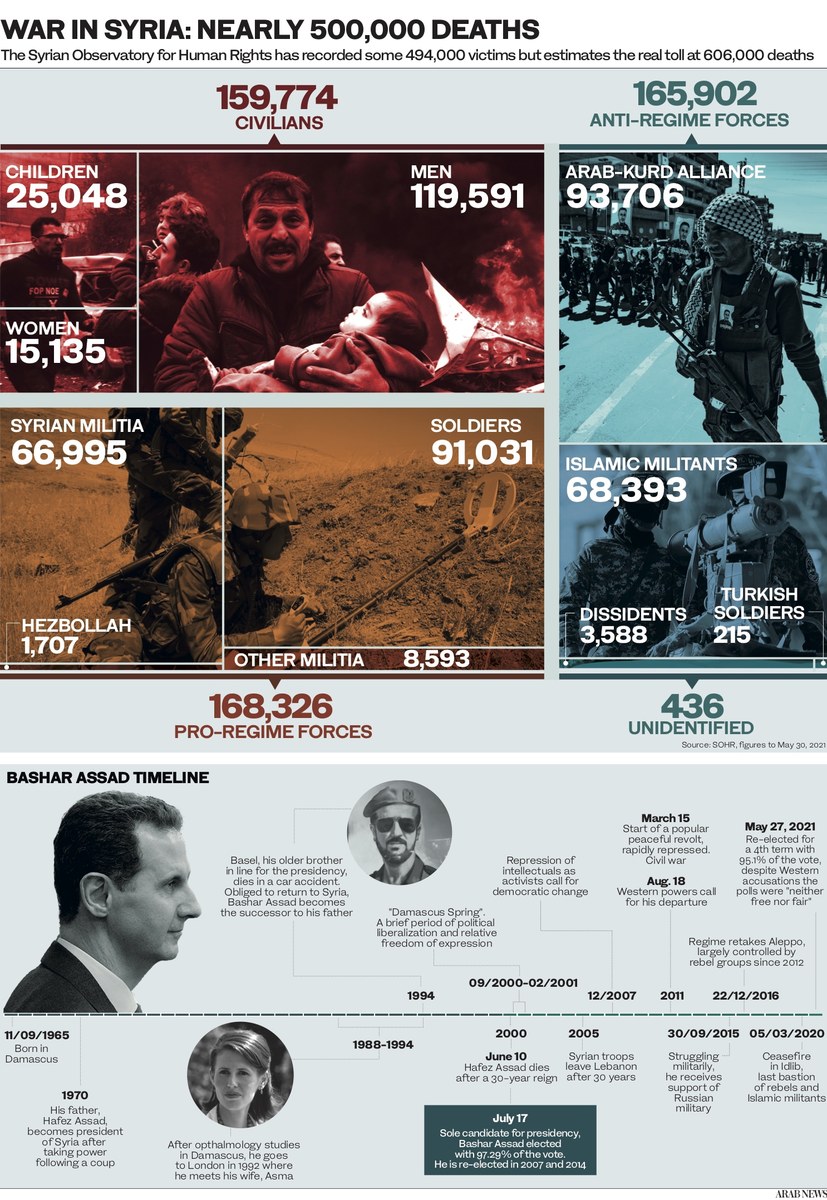
The Al-Shifaa hospital attack — the third suffered by the facility since 2019 — took place while I was in Syria interviewing doctors and healthcare workers who have toiled tirelessly and often under appalling conditions to alleviate the suffering of millions of displaced people in the northern provinces of Idlib and Aleppo.
Many of these doctors have been trying to save as many lives as possible while working in makeshift hospitals under siege, facing constant aerial bombardment and grieving the deaths of colleagues and family members.
The destruction of Al-Shifaa, which had been receiving UN funding for the past two years, marked the continuation of the horrors Syrians have endured since the outbreak of war in 2011, especially in those parts of the country that remain outside President Bashar Assad’s control.
Al-Shifaa was a testament to the idea that society could continue to function outside the confines of the Baathist state. And it seems that for this defiance, the hospital was summarily destroyed, like so many other healthcare facilities throughout northwest Syria.
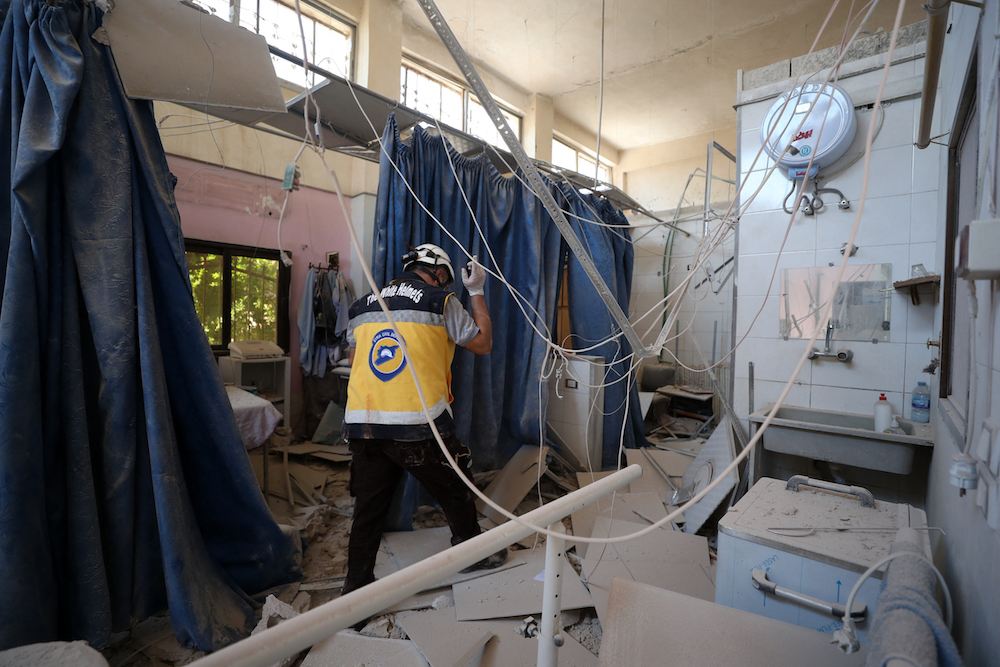
A member of Syria's Civil Defence service (White Helmets) inspects the damage on June 13, 2021, in one of the rooms of the Al-Shifaa hospital, a day after it was hit by artillery shells in the rebel-held northern Syrian city of Afrin. (AFP/File Photo)
According to UN monitoring groups, there have already been 10 strikes on health facilities and medical staff this year, killing at least 614 health workers. Russian and Syrian authorities have consistently denied their involvement in these attacks.
The attack on Al-Shifaa seemed to have been planned and executed with military precision. It was preceded by a number of missile strikes on the town of Afrin. Approximately an hour after those injured in these strikes arrived at the hospital, Al-Shifaa was hit.
A similar tactic was deployed in Idlib in March, when Al-Attareb hospital, supported by the Syrian American Medical Society, was struck after a drone tracked an ambulance carrying the wounded from an earlier airstrike.
Viewed together, the strikes are evidence of a deliberate strategy to maximize casualties and terrorize the civilian population.
The coordinates for both Al-Shifaa and Al-Attareb were shared with the UN long before the attacks, so all parties to the conflict were well aware of their location and their protected status under international humanitarian law.
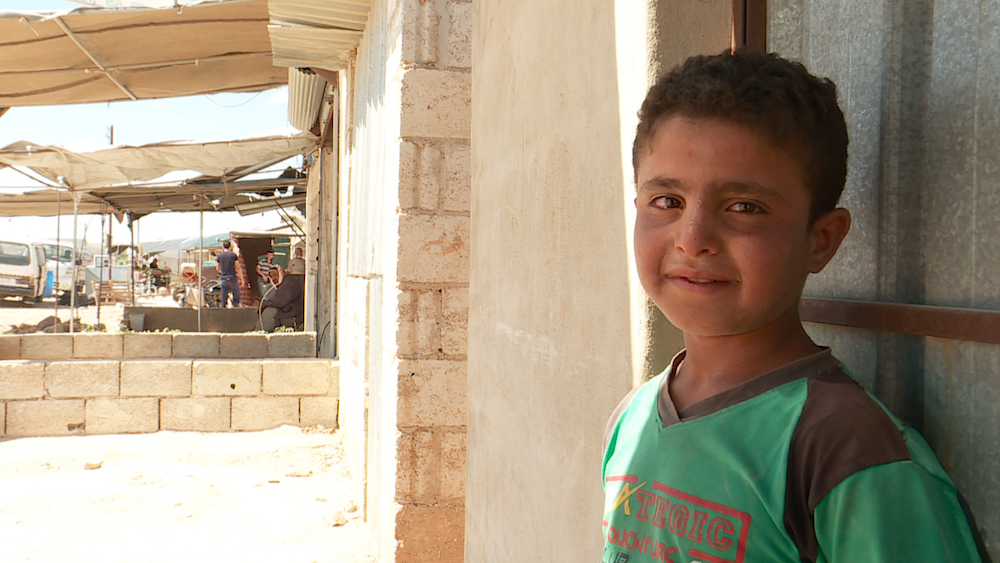
Many children in Zoghra IDP camp, northern Aleppo province, Syria, do not recall life before displacement. (AN Photo/Oubai Shahbandar)
Even so, guided missiles and artillery shells have continued to rain down on medical facilities, fuel depots and farmland across northern Syria under the guise of fighting terrorism.
I witnessed similar attacks on hospitals in March 2020 when I last traveled to northern Syria. I spoke with one doctor, now working in the Bab Al-Salamah hospital in northern Aleppo, about his experiences as the lone surgeon in a makeshift hospital in Maarat Al-Numan, at that time on the front line of an Assad regime offensive.
The city eventually fell to the regime and its Iranian militia allies, but the surgeon and others like him remained defiant, battling shortages, bombardments and their own exhaustion to stay at their posts. Many of the doctors, nurses and pharmacists I met, who had themselves been displaced from their homes, shared this sentiment.
One doctor from the city of Jarablus, now working at a health facility in the Zoghra displacement camp, told me he had received multiple offers to leave Syria and work abroad, all of which he had rejected.
It takes a special kind of dedication to remain and serve your fellow man in 40 C heat in a trailer that serves as an examination room.
It is easy to think of Syria as a list of statistics, and even easier for humanity to lose sight of the real cost of war. But a visit to Syria’s displacement camps brings the war into stark focus.
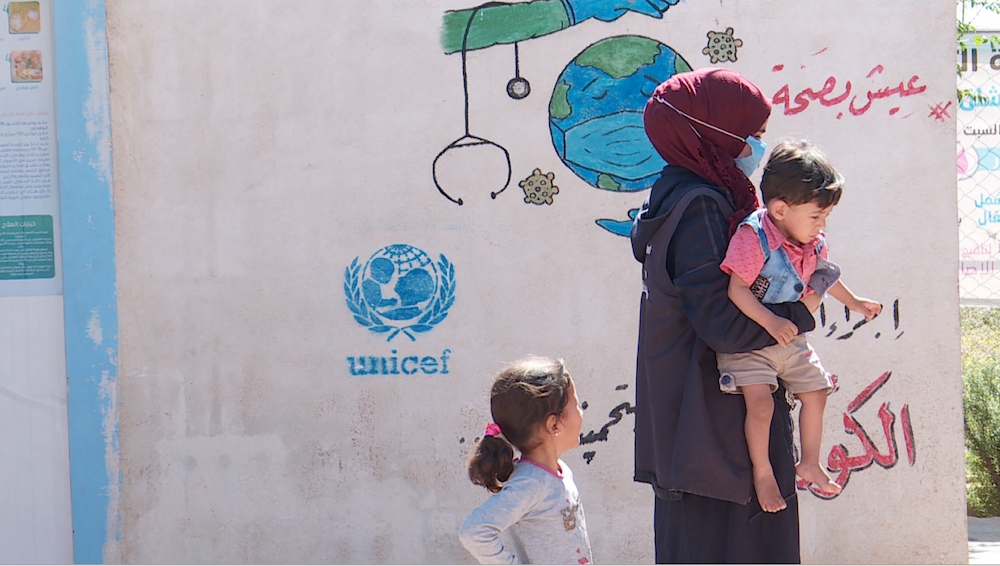
In temperatures of more that 40C, a small team of medical staff run a clinic out of a trailer in Zoghra IDP camp in northern Aleppo province, Syria. (AN Photo/Oubai Shahbandar)
Upon entering the Zoghra camp, visitors are greeted by a replica of the iconic clock tower of Homs — a monument to the homes left behind. Inside the camp, any one of the dozens of children, many with no memory of life outside the tent city, could have easily been me under different circumstances.
And any one of the families that now live in Zoghra could have been among those I saw when I last walked in the streets of Homs in 1999 on a summer visit with my own family as a teenager.
In short, there is something worth saving in Syria. You see it in the tired eyes of the lab technician who survived the Al-Shifaa strike, who told me about the patients he was helping in the emergency room who died in the blast. You see it in the miniature rose garden planted in the middle of the camp by two elderly men from Homs, who are eager to show off their little oasis.
The world faces a dilemma. Keeping Syria isolated and sanctioned may only prolong the misery of a populace, but allowing the Assad regime back into the international fold poses serious moral and practical problems.
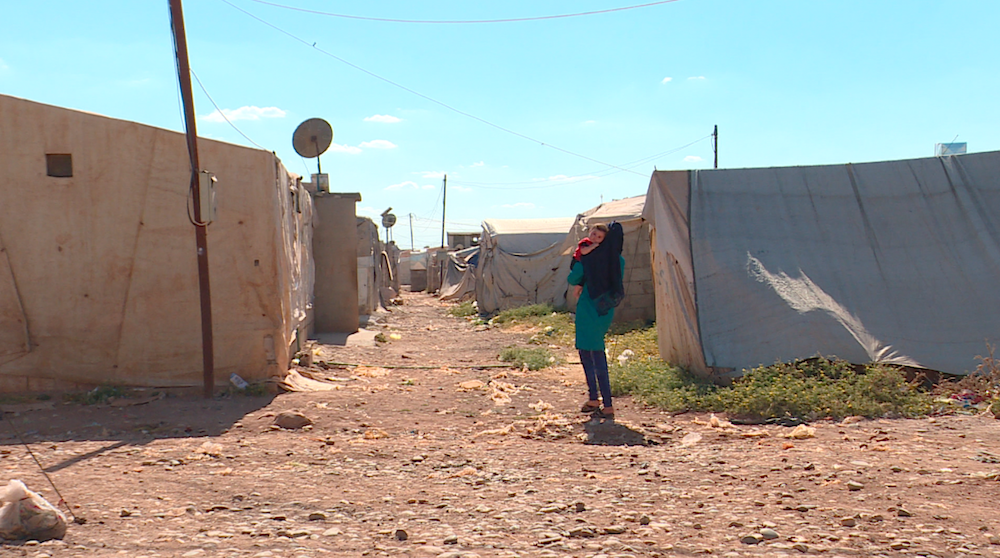
The attack on Al-Shifaa seemed to have been planned and executed with military precision. It was preceded by a number of missile strikes on the town of Afrin. (AN Photo/Oubai Shahbandar)
Many cannot accept the thought of forgiving a regime that used chemical weapons against its own people, intentionally targeted hospitals in airstrikes, and committed mass executions of political prisoners among other war crimes.
Nevertheless, more than a million people in the rebel-controlled northwest are at risk of being cut off if the UN Security Council does not renew authorization for cross-border aid delivery through the Bab Al-Hawa crossing at the Turkish border, the last remaining crossing for UN aid. A vote is expected on July 10.
In 2020, China and Russia vetoed resolutions that would have allowed two other crossing points — Bab Al-Salam and Al-Yaroubiya — to remain open. Now Russia has hinted it will block the renewal of the resolution on Bab Al-Hawa, insisting other aid routes via Damascus are available.
Aid agencies have very good reasons to believe that the Syrian government will use humanitarian supplies to punish neighborhoods and towns that were once under rebel control.
For many donor countries, allowing the regime to have a monopoly on aid distribution is unthinkable given its history of funneling UN aid to its favored militias and its inability or unwillingness to stop dubious non-governmental organizations from setting up a black market in relief items.
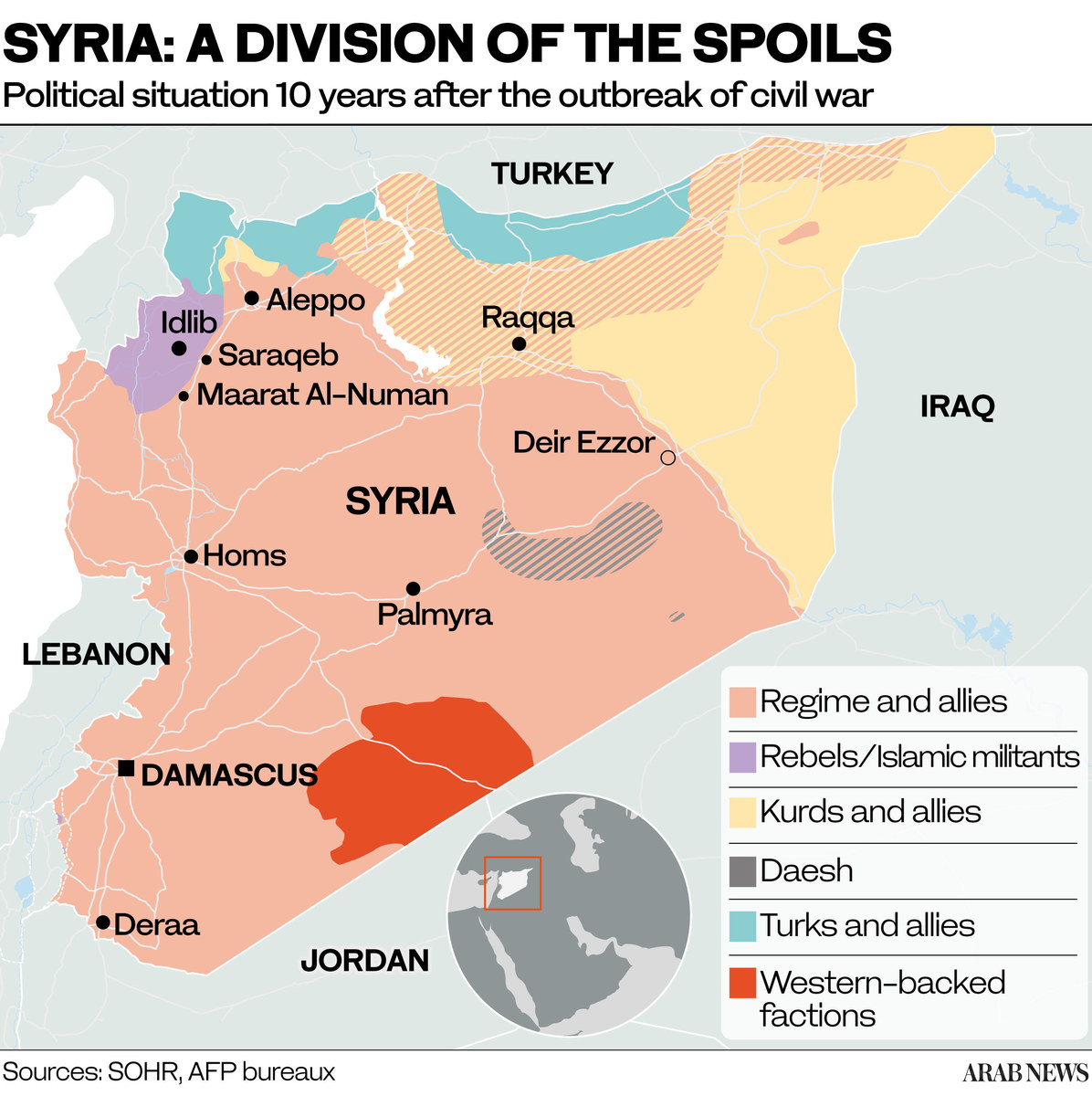
In January 2020, the Al-Yaroubiya crossing closed, ending UN delivery of aid across the border from Iraq. UN operations through the crossing were supposed to be replaced by deliveries from Damascus. However, the volume of aid reaching the area declined sharply due to the regime’s bureaucratic impediments and restrictions on access.
According to Amnesty International, closing Bab Al-Hawa to external aid would “callously” deprive Syrian civilians in these rebel-held territories of food and vital medicines.
Shortly after leaving Syria, I heard news of a regime airstrike on a small facility in the Idlib countryside housing a unit of Syrian Civil Defense first responders — popularly known as the White Helmets.
The building even featured the organization’s slogan on its facade: “To save one life is to save all of humanity.” It was completely destroyed.
----------------
Twitter: @OS26








